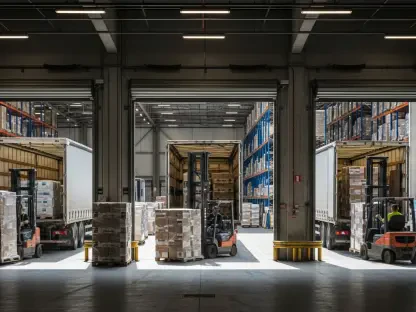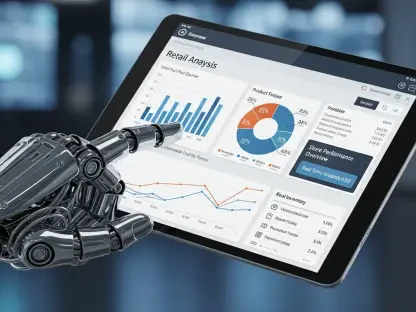Setting the Stage for a Logistics Revolution
Imagine a world where trillions of dollars in goods move across borders annually, yet the systems managing these shipments are bogged down by outdated tools like emails and spreadsheets, highlighting the urgent need for change. This is the reality of global trade logistics today, a sector ripe for transformation. The staggering inefficiency of fragmented processes often leads to costly delays and missed opportunities for importers. Enter AI-driven logistics platforms, a groundbreaking technology promising to streamline these complex operations. This review dives into how these platforms are reshaping supply chain management, addressing long-standing challenges with innovative solutions.
The significance of this technology cannot be overstated, as it tackles operational friction head-on, offering real-time insights and automation. By integrating vast amounts of data and predicting potential disruptions, AI platforms are not just a trend but a necessity for modern logistics. This analysis aims to unpack their core features, real-world applications, and the hurdles they face, providing a comprehensive look at their transformative potential.
Understanding the Core of AI Logistics Solutions
AI-driven logistics platforms represent a pivotal shift in how global supply chains operate, focusing on eliminating inefficiencies that have plagued the industry for decades. At their essence, these systems leverage artificial intelligence to unify disparate processes, creating a seamless flow of information across stakeholders. Their emergence comes at a critical time when the demand for speed and accuracy in logistics has never been higher, driven by the complexities of international trade.
These platforms stand out by addressing specific pain points, such as poor communication between systems and manual coordination efforts. By acting as a centralized control layer, they enable importers and other key players to navigate the intricacies of cross-border shipments with greater ease. This positions AI logistics solutions as an indispensable tool in the broader technological evolution of supply chain management.
Their relevance extends beyond mere convenience, aligning with the industry’s push toward modernization. As traditional methods struggle to keep pace with global demands, these platforms offer a glimpse into a more connected and efficient future. This foundation sets the stage for a deeper exploration of their defining features and capabilities.
Key Features and Technologies Powering AI Platforms
Seamless Data Integration and Workflow Automation
One of the standout strengths of AI logistics platforms lies in their ability to integrate diverse data sources, from tracking updates to documentation and communication channels. This capability ensures that all relevant information is consolidated into a single, accessible system, eliminating the chaos of scattered inputs. Such integration is crucial for importers who often juggle multiple touchpoints in their operations.
Beyond consolidation, automation plays a vital role in reducing human error and operational bottlenecks. Repetitive tasks like data entry or shipment scheduling are handled effortlessly by AI algorithms, freeing up personnel to focus on strategic decision-making. This not only boosts efficiency but also cuts down on costs associated with manual labor.
The impact of these features is evident in the smoother flow of logistics processes. By minimizing friction in day-to-day operations, companies can achieve faster turnaround times and maintain a competitive edge. This technological synergy is a cornerstone of why AI platforms are gaining traction across the sector.
Real-Time Visibility and Predictive Power
Another defining aspect of these platforms is their capacity to provide real-time visibility into supply chain activities. Stakeholders can monitor shipments, inventory levels, and potential issues as they unfold, ensuring transparency at every stage. This immediacy empowers logistics professionals to respond swiftly to emerging challenges, maintaining operational continuity.
Predictive analytics takes this a step further by using historical and current data to forecast disruptions before they occur. Whether it’s a port delay or a weather-related setback, AI systems can alert users to risks, allowing for preemptive measures. The technical sophistication behind these predictions hinges on machine learning models that continuously refine their accuracy.
The real-world benefits are profound, as proactive decision-making translates to reduced downtime and financial losses. For industries reliant on just-in-time delivery, this feature is a game-changer, offering a level of control that traditional systems simply cannot match. It underscores the strategic value of AI in navigating an unpredictable global market.
Latest Innovations and Industry Shifts
The landscape of AI-driven logistics is evolving rapidly, with new advancements reshaping how the industry approaches supply chain challenges. A notable trend is the rise of AI-native solutions designed specifically for logistics, rather than retrofitted from other sectors. These tailored systems are gaining momentum as companies recognize their precision in addressing unique operational needs.
Investor interest in logistics technology is also surging, with significant funding rounds reflecting confidence in AI’s potential to disrupt the field. This financial backing is fueling research and development, leading to more robust platforms capable of handling complex cross-border scenarios. The influx of capital signals a market eager to embrace innovation over outdated methodologies.
Additionally, there is a marked shift toward data-driven management within the industry. Organizations are increasingly prioritizing analytics over intuition, pushing for the modernization of legacy systems that have long hindered progress. This cultural change, combined with technological breakthroughs, points to a future where AI logistics platforms are the norm rather than the exception.
Practical Applications and Tangible Impact
AI-driven logistics platforms are making a measurable difference across various sectors, particularly in global trade for importers. Their deployment has streamlined operations for major players, enabling faster and more cost-effective shipment handling. For instance, some companies have reported container processing times improved by up to 75%, a testament to the efficiency these tools bring.
Beyond speed, cost reductions are a significant outcome, with detention expenses slashed by as much as 80% in certain implementations. High-profile brands in industries like retail and consumer goods have adopted these platforms, achieving productivity gains of around 30%. Such metrics highlight the direct benefits of AI in addressing logistical pain points.
The broader impact extends to enhancing supply chain resilience. By providing tools to anticipate and mitigate disruptions, these platforms ensure that businesses can maintain service levels even in volatile conditions. This adaptability is critical in a world where unexpected challenges, from geopolitical tensions to natural disasters, can derail operations overnight.
Challenges Hindering Wider Adoption
Despite their promise, AI-driven logistics platforms face several obstacles that limit their scalability and effectiveness. Technical challenges arise when adapting these systems to diverse markets, where varying infrastructures and standards complicate integration. This inconsistency often slows down the deployment process for multinational operations.
Regulatory complexities in cross-border logistics present another hurdle, as compliance with differing laws across regions demands significant resources. Data security also remains a pressing concern, given the sensitive nature of supply chain information. Breaches or mismanagement could undermine trust in these platforms, posing a risk to their adoption.
Efforts to overcome these limitations are underway, with strategic partnerships and continuous innovation playing key roles. Collaborations between tech providers and regulatory bodies aim to standardize compliance frameworks, while advancements in cybersecurity bolster data protection. Addressing these challenges is essential for the technology to realize its full potential on a global scale.
Future Prospects for AI in Supply Chain Management
Looking ahead, the trajectory of AI-driven logistics platforms appears poised for significant growth and refinement. Potential breakthroughs in algorithm sophistication could further enhance predictive capabilities, making systems even more adept at foreseeing disruptions. Such advancements would solidify their role as indispensable assets in logistics planning.
Broader global adoption is another anticipated development, particularly as smaller enterprises recognize the value of these tools. Over the next few years, from 2025 to 2027, an increase in accessible, cost-effective solutions could democratize access to AI logistics technology. This expansion would amplify its impact on international trade dynamics.
The long-term implications are vast, with the possibility of redefining how supply chains operate on a fundamental level. As these platforms evolve, they could drive unprecedented levels of efficiency, transparency, and collaboration across the industry. Their influence might extend beyond logistics, shaping economic patterns and global connectivity in profound ways.
Reflecting on the Journey of AI Logistics Platforms
Looking back, the exploration of AI-driven logistics platforms revealed a technology that has begun to redefine efficiency in global supply chains. Their ability to integrate data, automate workflows, and predict disruptions stood out as a powerful response to age-old industry challenges. The tangible results achieved, from slashed costs to faster processing, underscored their value in real-world applications.
While hurdles like regulatory complexities and data security have posed significant barriers, the ongoing efforts to address them through innovation and collaboration show promise. The industry’s shift toward data-driven management has also paved the way for wider acceptance of these tools. For stakeholders, the next steps involve investing in scalable solutions and fostering partnerships to navigate diverse markets effectively.
Moving forward, a focus on enhancing cybersecurity measures and simplifying compliance across borders emerges as a critical consideration. Exploring integrations with emerging technologies, such as blockchain for traceability, could further elevate the impact of AI platforms. These actionable steps offer a pathway to not only sustain but also amplify the transformation that AI has initiated in logistics.









